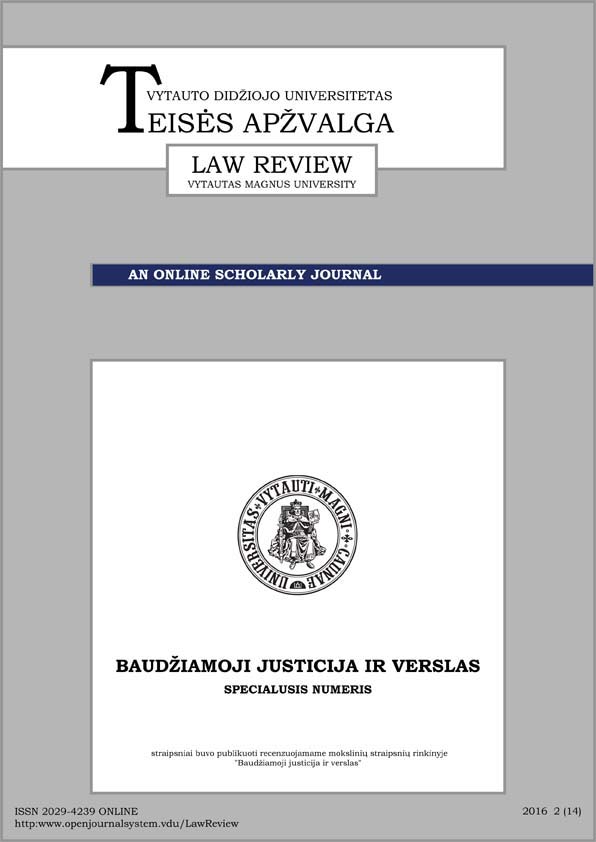Ar visada specialiųjų žinių panaudojimo baudžiamojoje byloje rezultatai laikytini patikimu įrodymų šaltiniu?
Can Results of a Special Knowledge Used in a Criminal Case Always Be Hold as Reliable Source of Evidence?
Author(s): Marina Gušauskienė, Linas BelevičiusSubject(s): Law, Constitution, Jurisprudence, Criminal Law
Published by: Vytauto Didžiojo Universitetas
Keywords: Criminal procedure; Conception of special knowledge; Usage of special knowledge; Sources of evidence
Summary/Abstract: Straipsnyje nagrinėjami atskiri diskusiniai specialiųjų žinių taikymo baudžiamajame procese klausimai, kuriems iki šiol mokslinėje literatūroje buvo skirta mažiau dėmesio. Aptariant specialiųjų žinių sampratą pabrėžiama, kad baudžiamojo proceso subjektams (ikiteisminio tyrimo pareigūnams, prokurorams, teisėjams), neturintiems specialiųjų žinių, sunku įvertinti specialisto išvadoje bei ekspertizės akte pateiktų išvadų, taikytos metodologijos, instrumentarijaus mokslinį pagrįstumą ir patikimumą, o nei įstatymas, nei teismų praktika neformuluoja jokių bent kiek aiškesnių vertinimo kriterijų. Kita problema ? teismai teikia prioritetinę įrodomąją reikšmę valstybinių institucijų ekspertų bei specialistų surašytoms išvadoms palyginti su privačių ekspertų, specialistų surašytomis, atsižvelgdami ne į išvadų turinį ir nustatytos informacijos pagrįstumą bei patikimumą, o į ją surašiusio asmens procesinę padėtį. Tokią praktiką gali keisti patys teismai, priimdami sprendimus konkrečiose bylose ir taip formuodami precedentus. Autoriai atkreipia dėmesį ir į specialistų bei ekspertų („valstybinių“ ir privačių) parinkimo problemos ypatybes. Manytina, kad tyrimai turėtų būti pavedami atlikti instituciškai ir tarnybiniais ryšiais su kitais proceso dalyviais nesusijusiems specialistams. Straipsnyje analizuojama užsienio praktika ir mokslininkų bei teismų suformuluoti kriterijai, kurie gali padėti įvertinti šiuos įrodymų šaltinius. Separate debatable issues on the use of special knowledge in criminal proceedings are analysed in the article, i.e. the issues, to which so far less attention was paid in the scientific literature. The concept of special knowledge is looked into; it is herein emphasized that special knowledge is the non-routine, non-judicial knowledge. It is exactly this aspect of special knowledge that causes actual difficulties when the subjects of criminal proceedings seek for the evaluation of the conclusions that are stated in the report, issued by the specialist, and in the statement of expertise, seek for the scientific reasonableness and reliability of the applied methodology and instrumentation because the pre-trial investigation officers, prosecutors and judges, who evaluate them, do not have special knowledge, whereas neither the law nor the judicial practice formulate at least some more explicit criteria of evaluation. The foreign practice and the criteria, formulated by foreign scientists and courts, that can help to evaluate these sources of evidence are analysed in the article. Meanwhile, it is stated in the Lithuanian judicial practice that the conclusions, drawn by the expert, and statements of expertise must be evaluated according to the criteria that are applied to all the evidence (interrelatedness, admissibility). It is reasoned in the article that usually such evaluation serves only as the formality that prevents from real revelation of the content of the source of evidence because of specificity of the information that is fixed in it. It is proposed to formulate the criteria as the basis for evaluation of reliability and veracity of the information that was obtained in the process of application of the special knowledge and, correspondingly, to draw the conclusions on its probative value.Also, the other related problem is analysed herein, i.e. the fact that the foreground probative value in the judicial practice is actually attached to the conclusions that are drawn by experts and by specialists of the state expert institutions, if compared with the conclusions that are issued by private experts and specialists; the latter are not even attributed to the relevant group of the sources of evidence, i.e. to the statements of expertise and to the conclusions, drawn by the specialist. Such differentiation, i.e. not according to the content of the conclusion, reasonableness and reliability of the information that was ascertained, but according to the procedural status of the entity/individual, that/who has issued the conclusion, is to be acknowledged as the one that does not meet the realities and objectives of criminal proceedings. As such judicial practice is derived neither from the legal regulation, nor from the general principles of criminal proceedings (from the principle of free evaluation of evidence), it is proposed to change the judicial practice; that can be done by the courts themselves as a result of making the decisions in the definite cases and, thus, forming the precedents.Also, the authors draw attention to the impropriety of selection of specialists and experts. The formed practice, when execution of the object investigation is entrusted to the specialists, working for the state institutions, who can acquire the independent status of the participant of the process in criminal cases (for example, the status of the pre-trial investigation institution, of the civil plaintiff), does not ensure objectivity and impartiality of such specialists and, correspondingly, ─ reliability of the conclusions, drawn by them. It is proposed to change this practice; the carrying out of the research must be delegated to the specialists who are neither institutionally related, nor bound by official relations. It could be regulated by the order to be issued by the Prosecutor General of the Republic of Lithuania that would approve the corresponding recommendations; the adoption of such recommendations is mandatory for the prosecutors and for the pre-trial investigation officers.
Journal: Teisės apžvalga
- Issue Year: 2016
- Issue No: 2(14)
- Page Range: 327-342
- Page Count: 16
- Language: Lithuanian

